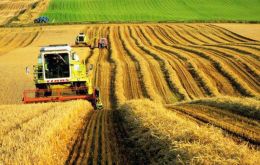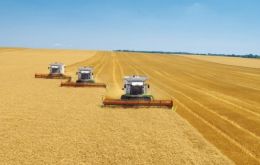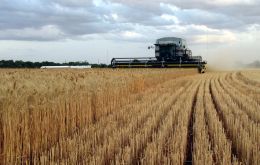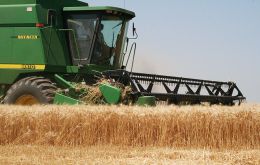MercoPress. South Atlantic News Agency
Tag: wheat Argentina
-
Thursday, August 9th 2018 - 07:02 UTC
Argentina expecting a bumper 2018/19 wheat crop of some 20m tons

Argentine farmers are finishing this year's wheat sowing, helped by moist soils and cold weather that is prolonging the vegetative stage of crops, raising hopes of high yields and a record harvest, growers and analysts said on Wednesday. Cold Southern Hemisphere winter weather allows seedlings to grow more sprigs per plant. Harvesting starts in November.
-
Friday, July 20th 2018 - 07:35 UTC
Argentina betting on a 2018/19 record wheat crop to spur the economy

A record wheat harvest expected in Argentina this year could arrive just in time to jumpstart the ailing country's economy in the fourth quarter, after growth has been hit by low investment, high inflation and a soy crop devastated by drought.
-
Monday, February 13th 2017 - 16:41 UTC
Argentina expects at least 15 million tons of wheat from the 2016/17 crop

Argentine farmers are expected to harvest at least 15 million tons of wheat in the 2016/17 crop year versus 11.3 million in the previous season, Agriculture Minister Ricardo Buryaile said last week. Wheat planting in Argentina expanded dramatically when President Mauricio Macri eliminated export taxes soon after his December inauguration.
-
Wednesday, July 27th 2016 - 12:57 UTC
Wet weather conditions Argentine wheat crop; 2016/17 corn area expected to expand

Hopes for a revival in Argentina’s wheat production are falling, even as ideas for corn growing continue to mount, in part at the expense of soybeans, for which seed availability has emerged as an issue. Argentina’s wheat production will increase in 2016-17, but not by as much as had been thought, the US Department of Agriculture bureau in Buenos Aires said, cutting to 13.7m tons their harvest forecast.
-
Thursday, June 23rd 2016 - 19:17 UTC
Argentina planting an additional million hectares of wheat this winter

Argentina is planting an additional one million of hectares with wheat this austral winter, taking the total area to 5.3 million hectares, spurred by the end of export duties and quotas, and a floating exchange rate, according to the Agro/Industry ministry in Buenos Aires.
-
Monday, June 20th 2016 - 08:41 UTC
Argentina estimates more corn and less soybeans for 2016/17

Argentina's Agro-industry minister Ricardo Buryaile estimated the 2016/17 corn crop should reach 52.9 million tons, given a 20% increase in the area planted, which will be in detriment of soybeans. The last crop of corn, 2015/16, was 37.9 million dollars.
-
Wednesday, May 18th 2016 - 12:07 UTC
Argentina forecasted to increase wheat area by 25% for a 15/16 million tons crop

Argentine wheat exports more than doubled in the first quarter, government data showed, as farmers rushed to sell stockpiles ahead of an expected jump in plantings spurred by the open-market policies of new President Mauricio Macri. The surge in Argentine supply is hitting an oversaturated world market and putting downward pressure on wheat prices already near their lowest levels in six years.
